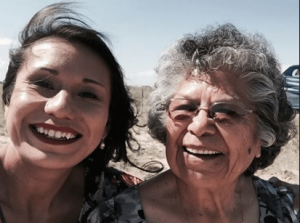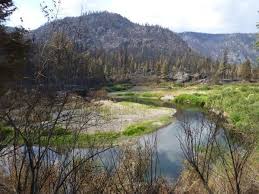
Alvina Marris always planned to come home — to the Confederated Tribes of the Colville Reservation — almost three million acres of rural land in northeast Washington State, where distance between houses is measured in minutes by car, and the largest town still does not have a stoplight or fast food restaurant.
“It’s really remote, here,” she tells me during a recent video conversation. She hasn’t changed much in the nearly fifteen years since she was an undergraduate research intern in the Eastern Washington University TRIO McNair Scholar Program, where I still work, and now sit at my desk talking to her image through my computer. She sits at a computer back home, in an office in that town without a stoplight, where she now works as the licensed clinical psychologist for the Confederated Tribes of the Colville Reservation.

“I grew up picking berries in the summer, and playing outside all the time,” she continues. “I have lots of first cousins who are like my brothers and sisters — it’s a huge family. We didn’t play video games, and were always running around and doing stuff, really just country bumpkins.”
As an undergraduate, Alvina completed two faculty-mentored TRIO McNair research projects at Eastern, then graduated with a bachelor’s degree in psychology and went on to earn a PhD in clinical psychology from Oklahoma State University. Currently, she provides psychological evaluation and therapy for tribal members on the Colville Reservation, seeing clients as young as three, all the way through the last years of life. As busy as she is, she has still agreed to share her time and experience in the first of a series of profiles about the work EWU TRIO McNair Scholars are doing after earning their PhDs. For her — and the other strong and community-minded people out there using education to make a positive change in this world — I am grateful.

“My grandmother would tell me stories about how they used to go out on horseback for a week to pick berries, and what it was like when the electricity first came on. She worked so hard her entire life, and has always been a really strong role model — an elder with high morals and standards who wants people treated well, and for people to respect others. I am deeply honored and proud to be named after her.”
The elder Alvina Cawston (pictured above with her granddaughter Dr. Alvina Cawston Marris) is the matriarch of the family. A strong full-blooded Nez Perce woman with an unyielding work ethic, she retired just last year, at 83, from the tribal higher education office. She is central to the strong community that Alvina attributes to being able to complete her education.
This education wasn’t easy. It required travelling great distances, not just physically, but mentally as well. The Colville Reservation has an all-native school from kindergarten to eighth grade, but high school requires taking an early morning bus down to the small town of Coulee Dam, just off the reservation. She played afterschool sports for the high school, which was half white students and half native, and wondered why she sat on the bench more than the non-natives, even as people from her own community would tease her for being a white girl. Most nights she did not get home until 8:30 or 9:00 pm, and one night she was jumped at the bus stop by people from her own community. Still, she received enough encouragement and support from family, teachers and others in the community, that she believed she could succeed in school, and should not waste any talents or gifts she had been given. She graduated from high school with her class, one of only five of the approximately twenty-four reservation students who began high school in Coulee Dam together.
With a tribal scholarship, she continued to college, where she took psychology classes at Eastern Washington University.
“If I would have known about the thousand of steps ahead, I might have just quit, but a lot of times I would just look around and notice things that other people were doing around me right then. I would ask myself stuff like: Why are people doing research?”
One day she asked this question about research to an EWU professor, Dr. Russell Kolts, who walked her over to Eastern’s TRIO McNair Program office. Eastern’s TRIO McNair program is one of 151 federally-funded McNair programs currently awarded competitive grants through the U.S. Department of Education to provide research opportunities and other scholarly activities to prepare first-generation, low-income and underrepresented students for success at the doctoral level. Eastern’s TRIO McNair program uses a cohort model to build an academic community of research scholars. All services, including faculty-mentored research internships, conference presentations, and graduate school preparation seminars, among others, are designed to build skills and create a strong network of scholarly support. Essential for anyone’s success in preparing for graduate school, such networks have been shown to be particularly important for students who have not been traditionally represented in higher education.
“One of the biggest challenges when I first moved away was not having a sense of community,” Alvina says of the first years in college. “But at McNair I did have that support. It felt like a family with everyone there. I know I wouldn’t have worked as hard, or been as committed to coming there to do research every day without that. I think anybody who comes from a community-oriented background needs to feel that connection, because if they don’t, it’s really isolating. You can just kind of close yourself off.”
As a psychologist, Dr. Cawston Marris encounters different forms of isolation every day.
“I see a real disconnect in our culture, an absence of traditions and culture passed down. People are really lost. They don’t know what to do. There’s lots of immediate gratification, technology and stuff, but even if they finish high school, its like people become stuck, afraid to leave here and with no cultural background to guide them. So one of the things I’m trying to incorporate in therapy is bringing back the culture into people’s lives. It is a big part of identity and strength.”
She speaks of the importance of “grit” and the things in her culture that are really hard but beautiful, “One thing I often share, it applies to therapy too, is that when people pass away in our culture, you are not allowed to cry for three days. This is to help your loved ones leave this world and make it to the other side. Because if they see you crying, the loved ones will not want to go on to their relatives and family on the other side. Those practices are hard, but they make you strong, and teach you how to persist and endure. It is these things that are missing. The next generation is unaware of these practices. Hard things really helped me. Helped me through grad school when I wanted to quit.”
There are certainly many hard things on the Colville Reservation. The tribal population exhibits high rates of cancer, and chronic diseases such as lupus and fibromyalgia, but there is little data to explain this. A few years ago, extremely high rates of suicide caused the governor to declare a state of emergency, and Dr. Cawston Marris sees a relationship between high incidences of depression and drug addiction with the chronic pain that accompanies many chronic diseases. There is a large gap in the research to identify and incorporate cultural traditions into psychological evaluation and treatment. But if one believes in the power of education and research, that knowledge can be applied for community benefit, then there are many positive changes.
The Tribe has started a research branch to collect more data to inform tribal programs, and Dr. Cawston Marris has begun a research project with the Frontiers of Innovation Program where she will focus on implementing a culturally sensitive intervention program with the birth to 5 population.
When asked about any advice she might give to current students preparing for graduate school, or anyone, she speaks of mindfulness, “Being present is very important,” she says. “It’s hard to go forward the more we worry about the future or live in the past. And any time that you don’t know or you are just a little bit curious about something, I would ask questions. It’s really hard sometimes as a minority to ask, because you don’t want others to perceive you as less than, but you don’t know what you don’t know a lot of times. You just have to keep asking. I now find that the ability to ask questions or say ‘I don’t know’ as a strength.”
She remembers the professor who in answer to her question about research walked her from his office to the TRIO McNair offices, “That little five minute walk definitely changed my life. Just ask. A question might open a door, and you never know what’s on the other side.”

